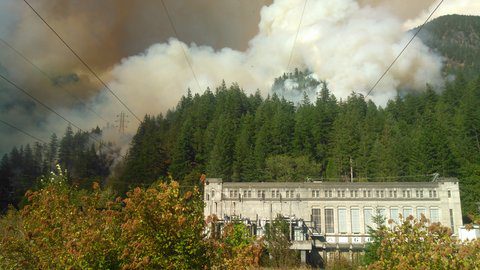
Ronda Strauch is a Climate Change Research and Adaptation Advisor for Seattle City Light
As wildfires begin to blaze in the Southwest, it’s clear that wildfire risk reduction is an important investment in protecting our planet. Although wildfire is a natural disturbance event, wildfire can be unwelcome in the wrong place or at the wrong time. Warmer and drier conditions driven by changing climate are increasing the frequency and intensity of wildfires, even in the traditionally wet forests of the Pacific Northwest. Here, the abundant vegetation and dead woody debris can fuel large catastrophic fires during extreme wildfire weather conditions–hot, dry, and windy. Thus, these forests are at greater risk from wildfire than in the past, as are the buildings and infrastructure interlaced within the forest.

City Light is paying attention to these changing wildfire conditions and is proactively taking action to reduce the risk of igniting a wildfire as well as the potential impacts of wildfire on energy facilities, electricity delivery, and the communities we serve. We are voluntarily developing a Wildfire Risk Reduction Strategy to reduce the potential impacts of wildfire on meeting our mission to deliver affordable, reliable, and environmentally responsible energy services to our customers.
The financial cost of a wildfire to a utility and community can be substantial. Thus, we are seeking federal funding to support our efforts to enhance defensible space around our critical infrastructure to reduce wildfire vulnerabilities in a fiscally responsible manner. As we are planning and funding preemptive actions, vegetation management crews are ever vigilant in maintaining our rights-of-way to minimize vegetation interactions that could spark or contribute to a wildfire.
City Light is not alone in its wildfire preparedness, and we see the value in coordinating our efforts. We are collaborating with the Washington State Department of Natural Resources, universities, other utilities, King County, and other city departments to understand wildfire hazards and to take actions to reduce wildfire risks.
You too can be a partner in protecting our forest and utility infrastructure by:
- carefully attending fires like campfires
- avoiding sparks from equipment and vehicles during dry weather
- notifying emergency services if you notice smoke
Together, we can prepare for increasing wildfire hazards and minimize the unwelcome consequences.